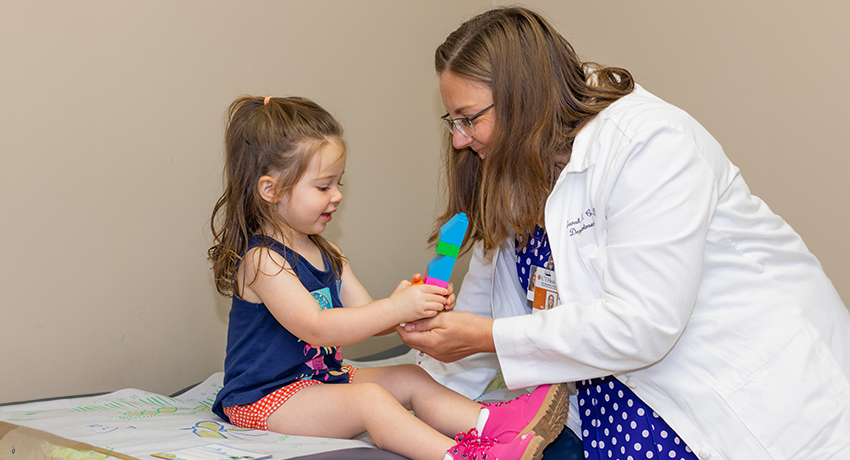For little ones, games like peekaboo and patty-cake can spark imagination, connection, and creativity that can mold young, developing brains. Plus, the laughter and joy that come from it is contagious!

Understanding the impact of play is essential for parents. Play might seem little more than a delightful distraction, but experts say it’s a cornerstone of healthy development. While fancy gadgets and electronic toys fill many family game rooms, it’s simple activities that lay the foundation for a bright and healthy future. Children discover their world, develop motor skills, and build social connections through play.
“We know simpler is better for kids’ brain development. Playing is how kids learn, so kids have to play to learn and not in front of a screen,” said Sarah J. Cavenaugh, MD, a pediatrician with UT Physicians. “That’s the biggest message I try to convey to parents.”
Simple discoveries
Pediatricians have long advocated for traditional forms of play involving basic toys like wooden blocks and non-technology-based items. Despite the trend toward expensive electronic toys, there is a growing recognition of the value of simple playthings. According to Cavenaugh, parents seem to be returning to these simpler toys, understanding their benefits for children’s brain development.
“There are 10 developmental milestones about play because it’s such an important part of the development process,” said Cavenaugh, an assistant professor of pediatrics at McGovern Medical School at UTHealth Houston. “Play can be simply defined as having fun, being active, and engaging with something.”
The toy industry is taking note, as well. One pioneer toy company developed a new wooden toy line in May 2024 for a “back-to-basics play experience for children.” The goal is to stimulate child development through open-ended play.

Prescription for play
Two UT Physicians pediatric clinics participate in a Prescription for Play program that encourages open-ended play as part of a collaboration between the LEGO Group and the Weitzman Institute. At UT Physicians Pediatric Primary Care – Texas Medical Center, patients receive a LEGO® DUPLO® kit at their routine well visits between 18 – 36 months.
Sandra L. McKay, MD, a UT Physicians pediatrician with UT Physicians Pediatric Primary Care — Texas Medical Center, uses the Prescription for Play program because it offers the opportunity for creative play.
“LEGOs are a great way to help children explore their minds and grow in their developmental tasks,” said McKay, associate professor with McGovern Medical School at UTHealth Houston. “Families love it. We also participate in Reach Out and Read, so they get a book and some LEGOs. It’s like Christmas in our clinic!”
Creativity and imagination
Cavenaugh encourages parents to put screens away, including their own, when children are little because they can distract a child who needs to play to learn.
“Give them space to do that, even though it can be messy,” Cavenaugh said. “Simple things like plastic measuring cups in your kitchen encourage kids to be creative. They don’t necessarily know what they’re supposed to do with them, so they just start trying things.”
As kids grow, they learn to use objects in different ways. This helps them foster and grow their imagination and creativity.
“Play isn’t just child’s play — it’s a developmental superpower,” Cavenaugh said. “Our job is to help parents recognize its importance, too.”
10 Developmental Play Milestones
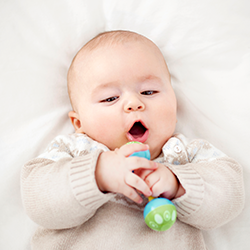
Early play
4 Months
Holds a toy
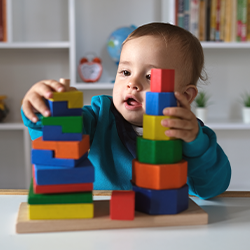
Exploratory play
6 Months
Reaches to grab toys, explores things by putting them in their mouth
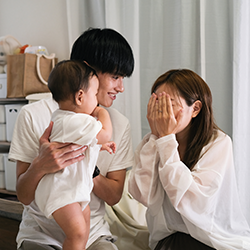
Interactive play
9 Months
Plays peek-a-boo, bangs things together
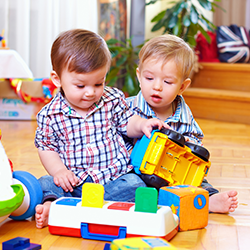
Imitative play
15 Months
Copies other children while playing
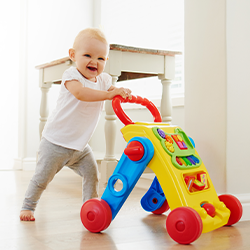
Simple toy play
18 Months
Plays with toys in a simple way (pushing a car)
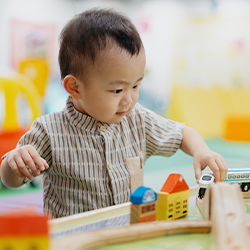
Multi toy play
2 Years
Plays with more than one toy at a time
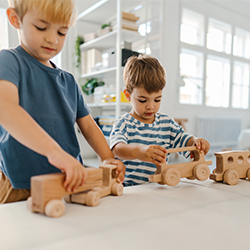
Plays next to others
2.5 Years
Plays next to children in parallel play
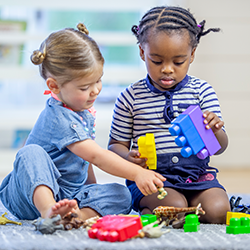
Plays with others
3 Years
Notices other children and plays with them
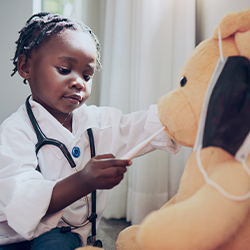
Pretend play
4 Years
Pretends to be something during play
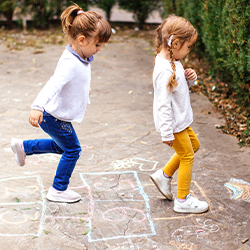
Cooperative play
5 Years
Follows rules and takes turn when playing games

